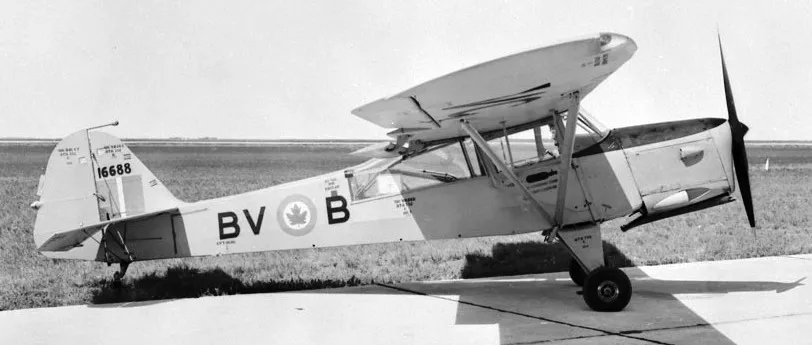Walker, James Elmslie
Killed in Flying Accident 1944-04-25
Service
RCAF
Unit
144 Wing- Wing
Base
Rank
Wing Commander
Position
Wing Commander
Service Numbers
J/3199
Home
 Edmonton, Alberta
Edmonton, Alberta
First Burial
 Brookwood Military Cemetery, Woking, Surrey, Uk
Brookwood Military Cemetery, Woking, Surrey, Uk
Taylorcraft AOP

Auster T7, RCAF (Serial No. 16688), BV-B, No. 444 (Air Observation Post) Squadron, 5 Aug 1952. On 1 Oct 1947, No. 444 (Air Observation Post) Squadron was formed at the Canadian Joint Air Training Centre (CJATC) at Rivers, Manitoba, flying de Havilland Chipmunk and Auster AOP Mk. VI aircraft. These aircraft were used to train army pilots in ranging and directing artillery fire. The squadron was disbanded on 1 Apr 1949.
Taylorcraft Aeroplanes (England) Limited began in 1938 at the Britannia Works, Thurmaston near Leicester, England making light observation aircraft (designed by the Taylorcraft Aircraft Corporation of America). 1,604 high-wing Taylorcraft Auster monoplanes were built during World War II for the armed forces of the UK and Canada, primarily for the role of Air Observation Post (AOP).
During the war the head office and drawing office were at a big old house on the outskirts of Thurmaston called "The Woodlands". The fuselages and wings were manufactured at Syston under the works manager by the name of Sharp. Sheet metalwork was done at the old 'en tout cas' works at Thurmaston. Final assembly, fitting out and testing took place at Rearsby aerodrome. The name changed to Auster (after the Roman name for the south wind) on 7 March 1946, when production shifted to Rearsby aerodrome, all in Leicestershire. All designs were evolved from the early Taylorcraft with a sprung skid or tailwheel beneath the fin (except for a low-wing aircraft called the "Agricola" designed for aerial farming work; only nine of these were completed). When the company was merged into Beagle Aircraft in June, 1961, the high-wing design was developed still further as the Terrier and, with a nosewheel, the Airedale.
The various Auster models were extensively used in the UK and British colonies after World War II for a variety of activities such as AOP, mail delivery, VIP transport, private owner flights and joy rides at seaside airports and town carnivals.
The Auster name was dropped in 1962 after Beagle Aircraft was created. https://en.wikipedia.org/wiki/Auster



 Canadian Virtual War Memorial
Canadian Virtual War Memorial Harold A Skaarup Web Pages
Harold A Skaarup Web Pages